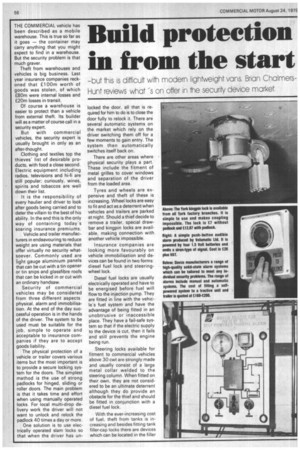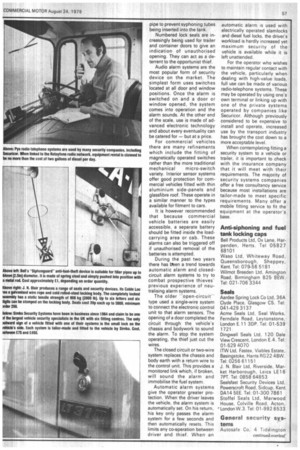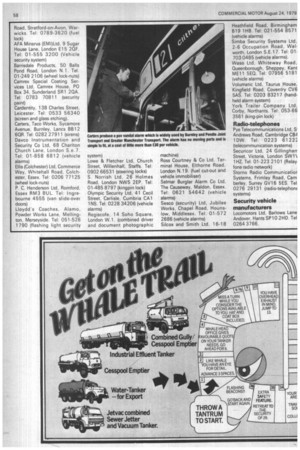Build protection in from the start
Page 58

Page 59

Page 60

If you've noticed an error in this article please click here to report it so we can fix it.
-but his is difficult with modern ligh-weight vans, Brian ChalmersHunt reviews what 's on offer in the security device market.
THE COMMERCIAL vehicle has been described as a mobile warehouse. This is true so far as it goes — the container may carry anything that you might expect to find in a warehouse. But the security problem is that much graver.
Theft from warehouses and vehicles is big business. Last year insurance companies reckoned that El 00m worth of goods was stolen, of which £80m were internal losses and £20m losses in transit.
Of course a warehouse is easier to protect than a vehicle from external theft. Its builder will as a matter of course call in a security expert.
But with commercial vehicles, the security expert is usually brought in only as an after-thought.
Clothing and textiles top the thieves' list of desirable products, with food a close second. Electric equipment including radios, televisions and hi-fi are still popular; curiously, wines, spirits and tobaccos are well down their list.
It is the responsibility of every haulier and driver to look after goods being carried and to deter the villain to the best of his ability. In the end this is the only way of containing today's soaring insurance premiums.
Vehicle and trailer manufacturers in endeavouring to reduce weight are using materials that offer virtually no security whatsoever. Commonly used are light gauge aluminium panels that can be cut with a tin opener or tin snips and glassfibre roofs that can be kicked in or cut with an ordinary handsaw.
Security of commercial vehicles may be considered from three different aspects physical, alarm and immobilisation. At the end of the day successful operation is in the hands of the driver. The system to be used must be suitable for the job, simple to operate and acceptable to insurance companies if they are to accept goods liability.
The physical protection of a vehicle or trailer covers various items but the most important is to provide a secure locking system for the doors. The simplest method is the use of strong padlocks for hinged, sliding or roller doors. The main problem is that it takes time and effort when using manually operated locks. For local multi-drop delivery work the driver will not want to unlock and relock the padlock 40 times a day or more.
One solution is to use electrically operated slam locks so that when the driver has un locked the door, all that is required for him to do is to close the door fully to relock it. There are several automatic systems on the market which rely on the driver switching them off for a few moments to gain entry. The system then automatically switches itself back on.
There are other areas where physical security plays a part. These include the fitment of metal grilles to cover windows and separation of the driver from the loaded area.
Tyres and wheels are expensive and theft of these is increasing. Wheel locks are easy to fit and act as a deterrent when vehicles and trailers are parked at night. Should a thief decide to remove a trailer, special drawbar and kingpin locks are available, making connection with another vehicle impossible.
Insurance companies are looking more favourably on vehicle immobilisation and devices can be found in two forms diesel fuel lock and steeringwheel lock.
Diesel fuel locks are usually electrically operated and have to be energised before fuel will flow to the injection pump. They are fitted in line with the vehicle's fuel system and have the advantage of being fitted in an unobtrusive or inaccessible place. They have a fail-safe system so that if the electric supply to the device is cut, then it fails and still prevents the engine being run.
Steering locks available for fitment to commercial vehicles above 30 cwt are strongly made and usually consist of a large metal collar welded to the steering column. When fitted on their own, they are not considered to be an ultimate deterrent although they do provide an obstacle for the thief and should be fitted in conjunction with a diesel fuel lock.
With the ever-increasing cost of fuel, theft from tanks is increasing and besides fitting tank filler-cap locks there are devices which can be located in the filler pipe to prevent syphoning tubes being inserted into the tank.
Numbered lock seals are increasingly being used for trailer and container doors to give an indication of unauthorised opening. They can act as a deterrent to the opportunist thief.
Audio alarm systems are the most popular form of security device on the market. The .simplest form uses switches located at all door and window positions. Once the alarm is switched on and a door or window opened, the system comes into operation and the alarm sounds. At the other end of the scale, use is made of advanced electronic technology and about every eventuality can be catered for — but at a price.
For commercial vehicles there are many refinements which include the fitting of magnetically operated switches rather than the more traditional mechanical micro-switch variety. Interior sensor systems offer good protection for commercial vehicles fitted with thin aluminium side-panels and glassfibre roof. These operate in a similar manner to the types available for fitment to cars.
It is however recommended that because commercial vehicle batteries are easily accessible, a separate battery should be fitted inside the loadcarrying area or cab. These alarms can also be triggered off if unauthorised removal of the batteries is attempted.
During the past two years there has Ileen a trend towards automatic alarm and closedcircuit alarm systems to try to combat prospective thieves' previous experience of neutralising alarm systems.
The older –open-circuittype used a single-wire system to connect the electronic control unit to that alarm sensors. The opening of a door completed the circuit through the vehicle's chassis and bodywork to sound the alarm. To stop the system operating, the thief just cut the wires.
The closed circuit or two-wire system replaces the chassis and body earth with a return wire to the control unit. This provides a monitored link which, if broken, will sound the alarm and immobilise the fuel system.
Automatic alarm systems give the operator greater protection. When the driver leaves the vehicle, the alarm system is automatically set. On his return, his key only passes the alarm system for a few seconds and then automatically resets. This limits any co-operation between driver and thief. When an automatic alarm is used with electrically operated slamlocks and diesel fuel locks, the driver's workload is hardly increased yet maximum security of the vehicle is available while it is left unattended.
For the operator who wishes to maintain regular contact with the vehicle, particularly when dealing with high-value loads, full use can be made of various radio-telephone systems. These may be operated by using one's own terminal or linking up with one of the private systems operated by companies like Securicor. Although previously considered to be expensive to install and operate, increased use by the transport industry has brought the cost down to a more acceptable level.
When contemplating fitting a security system to a vehicle or trailer, it is important to check with the insurance company that it will meet with their requirements. The majority of security systems companies offer a free consultancy service because most installations are tailor-made to meet specific requirements. Many offer a mobile fitting service to fit the equipment at the operator's base.
Anti-siphoning and fuel tank locking caps
Bell Products Ltd, Ox Lane, Harpenden, Herts. Tel 05827 68101 Waso Ltd, Whiteway Road, Queensborough, Sheppey, Kent. Tel: 079-56 5181 Wilmot Breeden Ltd, Amington Road, Birmingham 825 8EW. Tel: 021-706 3344
Seals
Aardee Spring Lock Co Ltd, 36A Clyde Place, Glasgow C5. Tel: 041-4293137 Acme Seals Ltd, Seal Works, Ferndale Road, Leytonstone, London E.11 3DP. Tel: 01-539 1721 Dingwall Seals Ltd, 120 Dale View Crescent, London E.4. Tel: 01-529 4070 ITW Ltd, Fastex, Viables Estate, Basingstoke, Hants RG22 4BW. Tel: 0256 61151 J. N. Blair Ltd, Riverside, Market Harborough, Lecs LE16 7PT. Tel: 0858 64853 Sealsfast Security Devices Ltd, Powerscroft Road, Sidcup, Kent DA14 5EE. Tel: 01-300 7861 Stoffel Seals Ltd, Marwood House, Colville Road, Acton, 'London W.3. Tel: 01-9926S33
General security systems
Autosate Co, 4 Tiddington Road, Stratford-on-Avon, Warwicks. Tel. 0789-3620 (fuel lock) AFA Minerva (EMI)Ltd, 9 Sugar House Lane, London E15 2QF, Tel: 01-555 3200 (Vehicle security system) Barrisdale Products, 50 Balls Pond Road, London Ni. Tel: 01-249 2106 (wheel lock-nuts) Camrex Special Coating Services Ltd, Camrex House, PO Box 34, Sunderland SR1 2QA. Tel: 0783 70811 (security paint) Cardentity, 138 Charles Street, Leicester. Tel: 0533 56340 (screen and glass etching).
Carters, Taco Works, Sycamore Avenue, Burnley, Lancs BB12 6QR. Tel: 0282 27911 (sirens) Davco Instrumentation and Security Co Ltd, 68 Charlton Church Lane, London Se 7. Tel: 01-858 6812 (vehicle alarms) Ellis (Colchester) Ltd, Commerce Way, Whitehall Road, Colchester, Essex. Tel: 0206 77125 (wheel lock-nuts) P. C. Henderson Ltd, Romford, Essex RM3 8UL. Tel( Ingrebourne 4555 (van slide-over doors) Lloydd's Coaches, Alamo, Powder Works Lane, Mellington, Merseyside. Tel: 051-526 1790 (flashing light security
system)
Lowe & Fletcher Ltd, Church Street, Willenhall, Staffs. Tel: 0902 66531 (steering locks)
S. Norrish Ltd, 26 Holmes Road, London NW5 2EP. Tel: 01-485 8797 (kingpin lock) Olympic Security Ltd, 41 Cecil Street, Carlisle, Cumbria CA1 1NS. Tel: 0228 34206 (vehicle alarms) Regiscofe, 14 Soho Square, London W.1. (combined driver and document photographic machine) Ross Courtney & Co Ltd, Terminal House, Elthorne Road, London N.19. (fuel cut-out and vehicle immobiliser) Selmar Burglar Alarm Co Ltd, The Causeway, Ma!don, Essex. Tel: 0621 54642 (vehicle alarms) Sesco (security) Ltd, Jubilee Works, Chapel Road, Hounslow, Middlesex Tel: 01-572 2686 (vehicle alarms) Silcox and Smith Ltd, 1 6-1 8 Heathfield Road, Birmingham B19 1HB. Tel: 021-554 8571 (vehicle alarms) Simba Security Systems Ltd, 2-6 Occupation Road, Walworth, London S.E.17. Tel: 01703 0485 (vehicle alarms). Waso Ltd, Whiteway Road, Queenborough, Sheppey, Kent ME11 SEQ. Tel: 07956 5181 (vehicle alarms) Volumatic Ltd, Taurus House, Kingfield Road, Coventry CV6 5AS. Tel: 0203 83217 (handheld alarm system) York Trailer Company Ltd, Corby, Northants. Tel: 053-66 3561 (king-pin lock)
Radio-telephones
Pye Telecommunications Ltd, S. Andrews Road, Cambridge CB' 1DW. Tel: 0223 6122 (telecommunication systems) Securicor Ltd, 24 Gillingharr Street, Victoria, London SW1\ 1HZ. Tel: 01-223 2101 (Relay fone radio network)
Storno Radio Communicatior Systems, Frimley Road, Cam berley, Surrey GV16 5ES. Tel 0276 29131 (radio-telephon( systems)
Security vehicle manufacturers
Locomotors Ltd, Barlows Lane Andover, Hants SP10 2HD. Tel 0264 3766.








































































































